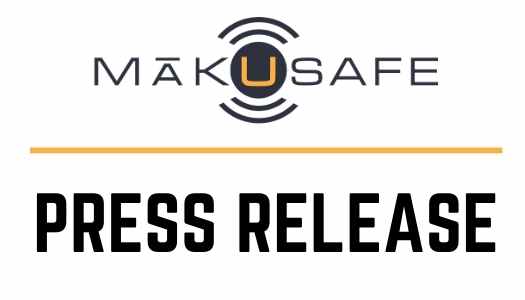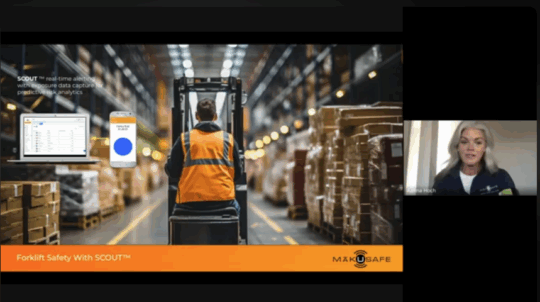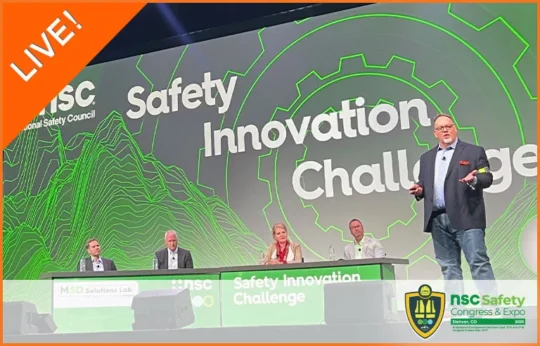MākuSafe CEO Gabriel Glynn Featured in AsiaTech Interview
February 12, 2020
Gabriel’s startup journey began over a decade ago, and in that time, he has experienced several successful exits. Today, Gabriel Glynn is the Co-Founder and CEO of MākuSafe™. The company has developed a wearable technology and software platform that gathers human motion and environmental data to identify risk to labor workers. They use machine learning to identify trends and to predict when/where accidents are likely to happen. Gabriel was named 2014 Entrepreneur of the Year at the Iowa Small Business Awards, in 2016 he was awarded Alumni of the Year by Des Moines Area Community College and was awarded the inaugural Uncommon Life Seal in 2018.
In an exclusive interview with AsiaTechDaily, Gabriel Glynn says:
“People often try to sell on the product features. The reality is that your customers have a need and problems, and you’re solving those. You’ll need to connect with customers on that level if you want them to buy.”
Read on to know more about Gabriel Glynn and his exciting journey.
Please tell me about your personal background, and what are you working on currently?
Gabriel Glynn: I was born and raised here in Iowa. My father worked 3rd shift at a factory most of my life, and my mom was a caretaker for adults with special needs. In 2005 I decided to leave a career working in retail to start my first company. Over the next 14 years, I was fortunate to start and sell five companies, most of which were in the technology space. Although I was in technology, my family background in manufacturing played a significant role. In 2015 I sold a software company, Slash Web Studios. At Slash Web, we built web and mobile software for the manufacturing industry.
Following that sale, I started a podcast on Advanced Manufacturing and began touring manufacturing facilities across the United States. During my tour, I witnessed one of the companies going through an environmental audit with the government organization, OSHA. It was that experience that inspired me to found MakuSafe Corporation, where I currently serve as Co-Founder and CEO. At MakuSafe, we’ve developed wearable technology for gathering environmental and human motion data that we can process in the cloud to identify and predict risk for workers, like my father.
What motivated you to get started with your company?
Gabriel Glynn: More than 1,000 workers every single day die in work accidents around the world. We believe that with data, we can significantly improve the lives of workers by identifying risk ahead of time.
What is your current main product, and (If there is any) can you share any product pivot story from founding to the current product?
Gabriel Glynn: We have both hardware and software components of our technology. The armband device is on its 6th generation, and our kiosk that charges the devices is on its 4th generation. We spent a great deal of time and capital on hardware product design and R&D, and we haven’t had to pivot with that aspect of the technology. Our cloud platform, MakuSmart, has seen some change. Through feedback from our users (Safety Managers), we recognized that we were overwhelming users with data and that we were not providing enough of a tool for them to do their day to day jobs. Our next iteration of the software will have a lot more to do with the day to day activities of a safety manager.
How have you attracted users and grown your company from the start?
Gabriel Glynn: We have had a tremendous amount of good press surrounding our company. Between the press, awards, and public speaking at events, we have attracted quite a following, and that has led to many of the relationships that we have today.
What’s your business model, and how have you grown your revenue? What strategy worked best?
Gabriel Glynn: We learned pretty early on that we needed to have a simple model for our customers, even with the hardware component of our system. We decided to create a System as a Service (SaaS) model that included the hardware components as a lease, the software, and data platform, all included at a monthly subscription price.
How much money (funding) have you raised in total so far? When was the recent funding round?
Gabriel Glynn: We have raised about $6.5M USD to date, with our most recent being a $1.5MM extension of a previously raised $3MM round.
How do you decide when to go out for fundraising? What were the internal decision processes in determining when to begin fundraising, and what were the logistics for this?
Gabriel Glynn: It seems like fundraising is a constant effort. Even when we don’t have around open, I’m out talking with prospective investors. We are always raising for achieving some sort of milestone, so our fundraising efforts are always driven by progress. Logistically, things have changed as we’ve matured. In the early days, it was talking to anyone and everyone who would listen. Today, most of our investor conversations are introductions from customers or other investors. Those conversations are a lot more fun and a LOT easier. You need a thick skin to fundraise. Being comfortable with people telling you no took me a while to get used to.
How many investors have you met so far, and which among them have invested in your past funding rounds? And how long does it take on average to finalize each funding round?
Gabriel Glynn: I won’t share a lot of detail aroura this question, but I can say that we have spoken with hundreds of investors and VC firms. We usually have people all teed up and ready to go before we open around, so the round itself goes pretty quickly, but getting everything ready is months of work.
How did you meet these investors, and which channels worked best for you?
Gabriel Glynn: Many of our investors are from the Midwest and came to us through an introduction from an existing investor. We did all the obligatory pitch sessions to the local groups, but we found our best luck came from having an investor bring a connection to our office to see our technology.
What are the biggest challenges you’ve faced and obstacles in the process of fundraising? If you had to start over, what would you do differently? (Your insight or advice on this would be very helpful for startups)
Gabriel Glynn: The biggest challenge we had was getting our story figured out. We’re trying to solve a BIG problem, and we need to articulate that in a very simple way. I probably iterated on my pitch deck 40 or 50 times in the early days. I slowly figured out what was resonating with people. Today, that story is concise and compelling. I also learned that the best way to keep investors happy is just to provide transparency and keep them in the loop. They are living the journey with us and need to know the good and the bad. We hold a monthly investor coffee social. No agenda, just a chance for investors to meet each other, and to see firsthand our progress.
One mistake I made early on was to put all my eggs in one basket. We decided it was time to raise a $1-$2MM round, and we had a corporate partner that wanted to lead that round with a $1MM investment. The person in charge of making those investments called us on a Friday to tell us they were in and to send the paperwork over. By the middle of the next week, they got cold feet and backed out. We had spent months working on the deal with them, and we didn’t have anyone else at the table, so we were broke for a few months while we regrouped.
What are your milestones for the next round? And what are your goals for the future?
Gabriel Glynn: We’re going to scale in 2020, and we’re looking to deploy our inventory across about 100 companies. We already have a chunk of that spoken for. If we hit our sales goals, then we’ll be well-positioned for a Series A.
What are the most common mistakes founders make when they start a company? (or What should all first-time startup founders know before they start their business?).
Gabriel Glynn: Don’t underestimate the power of good mentors. It took a small army of talented business people to help me get MakuSafe off the ground. It would never have happened if I tried to do it all on my own. Don’t think that you’ll remember everything and one day you’ll want to reflect on the journey, and if you didn’t take notes, then you’ll forget more than you’ll remember.
What do most startups get wrong about marketing?
Gabriel Glynn: People often try to sell on the product features. The reality is that your customers have a need and problems, and you’re solving those. You’ll need to connect with customers on that level if you want them to buy.
What’s the best advice you’ve ever received? And What advice do you have for someone who is interested in doing similar things like yours or in a similar direction?
Gabriel Glynn: Don’t forget to have fun. The emotions of your team and the culture of your company will follow your lead. Starting a venture-backed company is incredibly challenging, but the reward isn’t just at the end. There is so much to learn, so many great people to meet, and many incredible experiences along the way. Enjoy the journey, and if it’s successful at the end, then that’s a great bonus!
I would give that very same advice to anyone wanting to go down the road of entrepreneurship. The journey itself is lifechanging.
What are the one or two things that you would do differently if you could go back to 10 years ago?
Gabriel Glynn: If I could go back 10 years, I think I would have taken more time to enjoy life alongside the business. It’s a bit like having children, it goes so fast, and you keep telling yourself that at some point you’re going to slow down and spend more time focusing on them, but then the time has passed. My work doesn’t define me. My company isn’t my legacy. It’s all just a part of who I am, and I can’t forget about all the other important relationships in my life. My family, my friends, and my faith, in many ways, play a much bigger role in my legacy.
You can follow Gabriel Glynn here.





